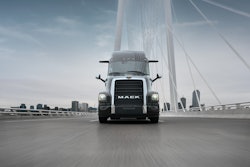
As trucking's supply chain normalizes and production capacities increase, suppliers are beginning to clarify how their fulfillment techniques were forever changed by the pandemic — and what that means for business in the future.
During the final presentation at the National Trailer Dealers Association (NTDA) opening general session Thursday in Colorado Springs, panelists from three trailer suppliers shared what they see as the new normal for sourcing in the trailer business.
Led by moderator Bill Schaffer from Overseas Hardwood Company, Jerrod Hoeft of Hydro Extrusion; Shelley Sheagley with Aurora Parts; and Rick Quinn of Steel Warehouse, said they believe their businesses have overcome the worst production shutdowns and shipping delays COVID-19 had to offer and have started to stabilize. The panelists admit some materials and specific components remain at below optimal levels but say, overall, the trailer supplier sector is getting close to the consistency it had pre-pandemic.
That assessment, which confirmed earlier statements Thursday by FTR's Eric Starks in his keynote economic address, should be good news for trailer OEMs and dealers when looking into 2023 and beyond. But the panelists also noted that the supply chain of 2023 is going to look a lot different than the supply chain of 2019, even if fulfillment levels are similar.
On the subject of capacity, Hoeft says Hydro Extrusion and other global aluminum suppliers are finally reaching production levels comparable to demand. But what gives him concern is their ability to scale up in the years ahead. He says some raw material companies failed to increase internal infrastructure last decade when business was strong and now could be challenged to scale up quickly if demand continues to rise. He says business investment is now a clear priority but even with focus and funding few suppliers are going to be able to ramp up their operations fast.
[RELATED: FTR's Eric Starks offers positive outlook for trailer sector at NTDA Convention]
Quinn also has capacity concerns for steel. He says U.S. steel capacity has always lagged below demand and relied on overseas imports to make up that difference. He says that could continue to occur but has concerns. He also fears the consolidation of domestic steel companies could lead to them prioritizing margin over marketshare and potentially limit capacity.
Labor is a challenge too. All three panelists said they view hiring quality workers as arguably their biggest daily hurdle. Sheagley says Aurora Parts has been beefing up its benefits packages and trying to create workplace flexibility to attract talented people. She says Aurora's culture helps. Once employees are onboarded and engaged their retention rates are strong, but culture alone won't solve any business's worker shortage.
Quinn says his business is in the same boat. He says "once we have someone for three or four months they rarely leave," though the process in getting them there has become more difficult. Hoeft says Hydro is investing heavily into improving workplace conditions in its facilities to retain its associates but admits aluminum extrusion is a hard, labor-intensive process. "We can't automate all of it," he says.
Finally, the panel discussed green manufacturing and the pressure their companies feel to alter their production to be more eco-conscious. Quinn notes many U.S. metal companies are more environmentally friendly than their Chinese counterparts but are not as effective at curbing emissions as some European nations. The panelists say practices that are working in Europe will likely be implemented here over time. Sheagley says many of Aurora's suppliers are investing in global and domestic green initiatives.
The panelists also say there is a lot of pressure from governments and customers toward suppliers to reduce their carbon footprint. In some cases, businesses are even announcing they will only do business with companies that share their emissions goals. Hoeft says he thinks that will be the norm very soon. "It will be your cover charge to get in the bar," he joked.











